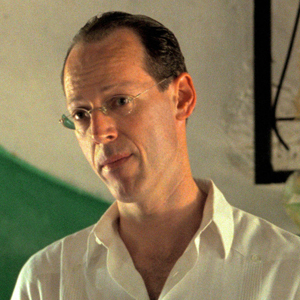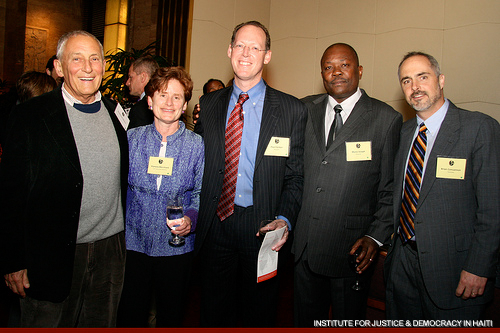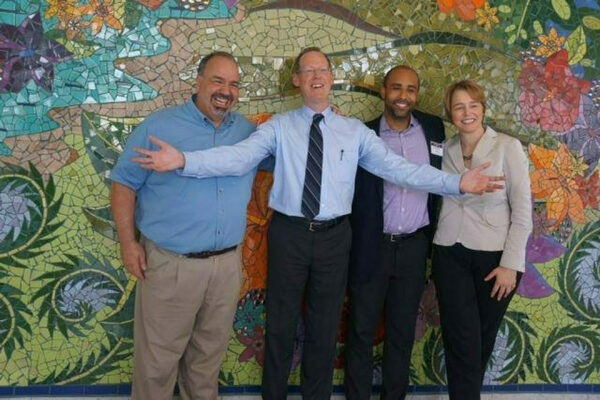"The essence of global health equity is the idea that something so precious as health might be viewed as a right." — Dr. Paul Farmer

The world who knew Paul Farmer through his work, his writing, and Partners in Health, the organization he created, have been mourning the news of his loss over the past week. He was of course a doctor but he was also an anthropologist and ethicist. As a doctor, he wanted to heal but he wanted to do so smartly and sustainably. As an anthropologist, he wanted to understand the historical, economic, political and cultural context of disease. And as an applied ethicist, he wanted to understand why preventable disease was allowed to ravage communities of the poor. For him medicine was a moral calling that moved him to seek out the most morally compelling health challenges in the most difficult contexts.
For those of us in the field of development, Paul was a special person. He was a radical, an iconoclast, a prophet, a truthteller. He said loudly and boldly what most development professionals know but are often afraid or unable to say. Paul forged his own path and in so doing, he spoke truth to power humbly but powerfully. His example made it easier for others to follow in his path, challenge conventional thinking, acknowledge failure, and seek new and better solutions to seemingly intractable problems.
Paul was a man of faith inspired by the call of liberation theology to opt for the poor and sought to model this through the healing actions of his approach to medicine. For Paul, liberation was about the realization of human rights — both political and civil — as well as economic, social, and cultural rights. He publicly championed the right to health: true equal access to quality and affordable healthcare for all, not just for those who could afford it. He viewed the failure of societies to ensure the realization of such equal access and condoning preventable disease and “stupid deaths” (a Haitian phrase) among the poor as a human rights violation that called for accountability. He saw the failure of societies to build these kinds of inclusive health systems as, at best, a failure of imagination and, at worst, a form of structural social exclusion and violence. Paul saw his vocation as twofold: both healing the sick and reforming the sick societies that sustained these forms of structural violence.
Many eloquent tributes have been written about Paul over these past several weeks. While I knew Paul as a professional colleague who I saw and knew from a variety of encounters over the years, there are others who worked with him very closely over decades who knew him far more deeply and profoundly than me. I thought our best tribute to him would be to share remembrances from two of those individuals: Brian Concannon, the Executive Director and founder of the Institute for Democracy and Justice in Haiti, and Jim Ansara, the Executive Director and founder of Build Health International. Brian worked with Paul over several decades related to their shared interest in Haiti and Jim took on the role of designing and building the large Partners in Health hospital in Mirebalais, Haiti that is now the center of Paul’s legacy to the Haitian people. Both have written very personal and moving remembrances of Paul, that they have kindly given us permission to share. We are most grateful to them both.

"Paul Farmer was many wonderful things to many people. He is especially heralded for saving millions of lives, and inspiring legions of people to dedicate their lives to fighting poverty and disease. Every word of those heralds is true and important to remember. But it is just as important to remember that the foundation of Paul’s outsized impact is his resolute focus on reducing the imbalance of power that made his patients sick, whether they were in Haiti, Peru, Rwanda or Boston.
Paul’s foundational insight was that because HIV-AIDS, tuberculosis and many other infectious diseases disproportionately affect the poor, any serious effort to reduce the disease required addressing the inequality that protected some but left so many others vulnerable. Paul helped show that saving lives at scale could not be achieved through charity but only through justice and solidarity.
We cannot replace Paul, but we can use what he taught us to continue the work he left undone. We can oppose US government support for another repressive Haitian government. We can directly address the inequality that leaves some of us more vulnerable to AIDS, COVID-19, jail, repression, voter suppression and hunger, and others with ample privilege that we can put to use fighting this system. Paul’s torch that cast such great light during his life is heavy. But the vast community that he taught and inspired—healthcare workers, legal workers, activists, citizens—might just be enough to carry it." — Brian Concannon
Read the full piece on the IJDH website.

PIH co-founder, pictured at the opening of Hôpital Universitaire de Mirebalais in 2013.
(Courtesy of Jim Ansara)
"Dr. Paul Farmer’s unreasonable vision about what was possible, and what could be accomplished has led to great advancements in the global health community, time and time again. From proving against conventional wisdom, and the scientific community, that multidrug-resistant tuberculosis could be treated successfully through a low-cost community health model, a program in Haiti to treat HIV/AIDS patients, building a hospital, cancer center, and then medical school in rural Rwanda, to leading PIH into an emergency Ebola response and then permanent programs in West Africa. There are scores of examples where Paul pushed organizations and individuals to do projects and take on challenges that seemed at the time to not make sense or be possible and they lead to catalytic change.
There will be more great physicians and scholars in global health. There will be other teachers and visionaries. There will be leaders who build extraordinary organizations. But there will never be another Paul Farmer." — Jim Ansara
Read the full piece on wbur.org.